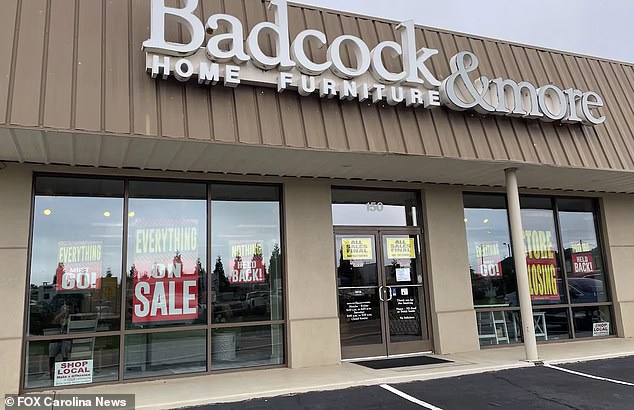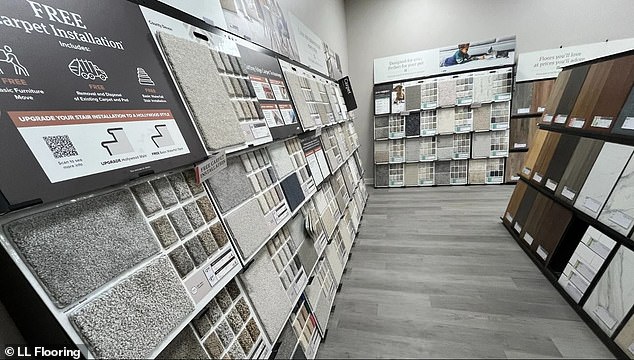Home Depot rival saved – but half of stores will still shutter for good as old owner gets his way in bankruptcy battle
After finding a last-minute buyer, one of America’s largest flooring suppliers decided not to close all of its stores.
LL Flooring, formerly known as Lumber Liquidators, announced last week that it is filing for bankruptcy after three decades in business.
It has emerged that the bosses have now struck a deal with private equity firm F9 Investments for the sale of their company.
F9 is owned by Tom Sullivan, who founded Lumber Liquidators more than 30 years ago and left in 2017. He says the company is going “back to basics” and will also be changing its name back.
Just over half of the 430 remaining stores will close permanently, with stock being sold off during huge clearance sales over the next 12 weeks.
Clearances are also expected to take place in the stores that remain, as Sullivan looks to refresh the range.
LL Flooring, which had 442 stores in 47 states earlier this year, filed for Chapter 11 bankruptcy on Aug. 11. It had planned to close all of them, but now half have been saved at the last minute by their former founder.
Under the terms of the deal, which is expected to close in late September, F9 will acquire 219 stores and a distribution center in Virginia, as well as the LL Flooring brand.
However, the remaining 211 stores will still close.
That includes 117 locations that recently began closing and 94 others that were already in the process when the Virginia company filed for bankruptcy protection on Aug. 11.
The retailer, which specializes in hardwood flooring, has struggled with declining sales over the past year as families cut back on home renovations.
Last week, LL Flooring announced it would scale back operations and close all of its stores after negotiations failed to find a buyer.
But that changed after a deal was reached with F9 on Friday.
In a statement, Charles Tyson, president and CEO of LL Flooring, said the company is “pleased to have reached this agreement” with F9 “after the significant efforts of our team and advisors to preserve the business.”
Tyson added that LL Flooring remains “committed to continuing to serve” customers and suppliers while the transaction is approved by the bankruptcy court.
F9, based in Miami, is owned by Tom Sullivan, who founded Lumber Liquidators more than 30 years ago.
Sullivan told The Associated Press that the 219 stores being purchased by F9 will re-open under the Lumber Liquidators name.
“We’re going back to basics,” Sullivan said.
“It’s actually yellow and black coming back… We know what worked before. It’s not fancy offices in Richmond with 200 people who didn’t know anything about the flooring business.
“It’s the great people in our stores who know flooring and the customers who want a good deal and know Lumber Liquidators is the place to go.”
Sullivan explained that the company plans to narrow the selection of flooring options to a more “manageable” offering and eliminate materials that feel duplicate or don’t sell well.
Customers will likely receive deep discounts on much of the inventory left over from LL Flooring’s bankruptcy.
He added that the company will work closely with Cabinets To Go, another F-9 brand he founded, to make shipping more efficient.
After news broke last month that LL Flooring was in financial trouble, customers took to Reddit.
“People are mortgaged to the brim with properties that need maintenance. They can’t afford the upgrades right now,” one person wrote.
Tom Sullivan founded Lumber Liquidators in 1994 by purchasing surplus lumber from companies and reselling it at a discount.
The company initially did business out of the back of a pickup truck in Stoughton, Massachusetts.
Shortly thereafter, Sullivan began negotiating directly with the factories, seeking to cut out the wholesalers who acted as middlemen and to undercut the competition by charging lower prices.
The company previously faced controversy after a 2015 “60 Minutes” segment reported that the laminate flooring it sold contained illegal and dangerous levels of formaldehyde.
Lumber Liquidators later said it would stop selling the product and agreed to settle two class action lawsuits for $36 million in 2017.
Sullivan left the company in 2017 and has since fallen out with the board of directors. He has tried to take over the company but has so far been rebuffed.
Lumber Liquidators was renamed LL Flooring in 2022. The company had struggled to turn a profit in recent years.
LL Flooring’s troubles come amid widespread “retail apocalypse,” with stores struggling with increasingly tight margins while Americans cut back on spending.
In the first four months of 2024, there were almost 2,600 store closuresIf this trend continues, nearly 8,000 people will have died by the end of the year.
Last week, it was announced that Big Lots, which has already closed a quarter of its 1,400 stores, is on the brink of bankruptcy. The news sent shares plummeting 50 percent.
In recent months, Walmart has closed three more of its underperforming locations, while Best Buy closed ten in march.

Badcock is another DIY store that has had financial problems. It had more than 380 stores in Florida, Alabama, Mississippi, Tennessee, North Carolina, South Carolina, Georgia and Virginia – all of which are closing on an unknown date

LL Flooring is the largest specialty flooring company in the US
Dollar stores have also been hit hard: 99 Cents Only announced in April that it would close all 371 of its locations in California, Texas, Arizona and Nevada.
The 1,000 closures of Family Dollar and its sister company Dollar Tree will take place over the next three years.
Express, a well-known mall-based retailer, filed for bankruptcy in April and said it would close 95 Express locations, in addition to all of its UpWest stores.
In early May, Rue21, the teen fashion chain that is a fixture in malls across America, also announced that it would close all of its 543 U.S. stores after filing for bankruptcy.
